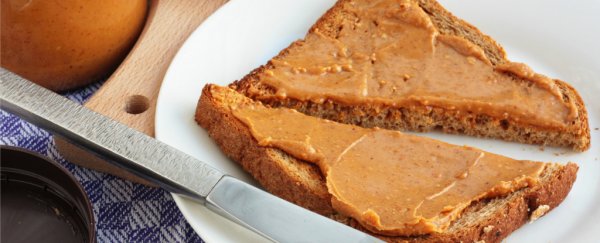With the rate of peanut allergies on the rise worldwide, a new study has provided even more evidence that exposing babies to peanuts early on can provide long-lasting protection against life-threatening allergies.
Researchers worked with babies who had a high risk of allergies, which meant they'd already suffered from eczema or an allergy to eggs. But by giving them regular doses of peanut paste before they were 11 months old, the team showed that they could reduce their risk of developing peanut allergies at the age of five by more than 80 percent.
They've now tested the same children a year on, and have demonstrated that the protection lasts - even when the kids are no longer regularly eating peanuts.
That's really exciting, because it's often after prolonged periods of no exposure that allergies rear their head. But even after a year off, the children who'd eaten peanuts before their first birthday were still protected - with an overall 74 percent reduction in allergies compared to babies who'd been kept away from the food their whole lives.
"[The research] clearly demonstrates that the majority of infants did in fact remain protected and that the protection was long-lasting," lead researcher Gideon Lack from King's College London in the UK, told BBC News.
"I believe that this fear of food allergy has become a self-fulfilling prophecy, because the food is excluded from the diet and, as a result, the child fails to develop tolerance."
In the initial experiment, which was published last year, Lack and his team took more than 600 babies that had shown signs of being allergy prone, and split them into two groups - one avoided peanuts altogether, and the other was given small daily doses of peanut mushed up with other foods, to reduce choking risk.
After five years, they found that 17 percent of the children in the avoidance group had developed peanut allergies, compared to only 3.2 percent in the exposure group.
It was called a "landmark study" for allergy research at the time, but what wasn't clear was whether the children would have to continue to eat peanuts daily in order to maintain the benefits.
So the team continued to follow 550 of the children from the original study for an additional year, during which time all of them were told to avoid peanuts entirely. By the end of the sixth year, the allergy rates hadn't changed - only three of the children who had been fed peanuts as babies developed new allergies during the year off, but so did three of the children from the avoidance group.
"A 12-month period of peanut avoidance was not associated with an increase in the prevalence of peanut allergy," the authors write in the New England Journal of Medicine.
More research needs to be done to establish exactly how much peanut paste needs to be given during that first year of life, but doctors have already begun to change their recommendations to parents.
"This new study is great because … it looks like the benefit [of early exposure] is essentially permanent," Scott Sicherer, a paediatric immunologist and allergy specialist at Mount Sinai Hospital in New York who wasn't involved in the study, told NPR.
Lack recommends that parents with kids already showing signs of allergies "consult with an allergist, paediatrician, or their general practitioner prior to feeding them peanut products". But he encourages other parents not to be scared of giving their kids a taste of peanuts.
His team is now looking into whether the allergy protection will last once children are allowed to eat peanuts as little or as often as they feel like.
If that's the case, it will drastically change the lives of the 20,000 babies - and rising - in the US and UK that are diagnosed with peanut allergies each year. "Taken together these are reassuring findings that pave the way to stem the epidemic of peanut allergy," Michael Walker, a medical adviser to the UK government who wasn't involved in the study, told the BBC.
